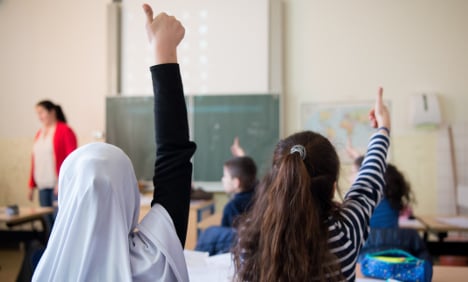For 15-year-old Mustafa, the trickiest part about learning German is knowing when to use the articles der, die or das.
“And the umlaut,” his classmate Majd reminds him, sending both Syrian teens groaning in mock frustration at the vowel alteration, one of the quirks of German grammar.
But they're not really complaining. Having escaped the fighting at home and survived the harrowing journey to Europe, they are glad to be back in school.
For them, as for young refugees everywhere, it's the first step back to a normal life. But they are fast learning that the hard work is only just beginning – for pupils and teachers alike.
Mustafa, Majd and their families were among the nearly 900,000 migrants who streamed into Germany last year. Around a third of them were minors, and the country now faces the Herculean task of absorbing the newcomers into its school system.
The obstacles are formidable. Most of the youngsters don't speak a word of German on arrival and have usually missed months, if not years, of school. Many are also scarred by the experiences that led them to flee their homes in the first place.
“It's a huge challenge,” said Ilka Hoffmann, a board member of the GEW, Germany's largest teachers' union.
She estimates Germany will have to hire some 24,000 new teachers to cope with the influx, and that's without including the urgent need for more psychologists and counsellors in schools.
“Trauma manifests itself in different ways,” Hoffmann told AFP. “We're ill-prepared in that regard.”
The Kultusministerkonferenz, a grouping of the nation's state education ministries, has calculated that educating the child refugees will cost an extra €2.3 billion ($2.5 billion) a year.
'Intense'
In German classrooms today, Chancellor Angela Merkel's “Wir schaffen das” (We can do it) motto about integrating the migrants is more than just a catchphrase. It's a daily assignment.
Mustafa and Majd are enrolled in the Heinrich-von-Brentano school in Hochheim, a picturesque town west of Frankfurt.
To cope with the refugee arrivals, the school has set up two so-called “intensive classes” for 22 pupils where the immediate focus is on learning German, the same approach that has been taken nationwide.
In Mustafa's small classroom, where most of the students are from Syria, Iraq and Afghanistan, the atmosphere is jovial, but their teacher Michael Smiraglia says there's no denying the daily difficulties.
With pupils ranging from the gifted to those who are still learning the Latin alphabet, Smiraglia has to tailor his lessons to a range of levels and come up with several approaches to the same exercises.
Then there's the added challenge of working with teens who have lived through traumatic events, which can trigger disruptive or antisocial behaviour.
“I quickly found that the name 'intensive class' also meant it would be intense for me as a teacher,” Smiraglia told AFP, while his pupils, in halting German, read out a dialogue about ordering lemonade and ice cream.
He says his background as a family counsellor, which saw him work with traumatized youths, has proved “immensely helpful” in bonding with the class.
“I have pupils aged 12 to 15 who have feared for their lives,” the bespectacled, soft-spoken teacher says, stressing the importance of giving the teens a safe place to share their stories.
“It's a gift for me when they open up to me because it helps me understand them better and deal with things like inappropriate behaviour.”
Breaking the ice
For the students the real test of their progress will come when they move on from the cocoon of the intensive class to regular classes, where teachers have a curriculum to follow and may not have the time or tools to focus on their individual needs.
To ease the transition, the Brentano school's refugee pupils already spend several hours a week with their German peers for lessons such as English, maths or sports.
The results are mixed, with Mustafa pointing out that language remains a barrier. “The teachers speak so fast, I don't understand much.”
But the mingling has helped break the ice between the newcomers and their German schoolmates, as has playing football during break times. “We play together and then we also learn a bit more German,” says Mustafa.
Generally though, the teens in the intensive classes admit they tend to stick together in their free time, speaking in their native tongues.
“I don't have a lot of contact yet with the German kids,” says 14-year-old Marjan from Afghanistan. “But everyone is very friendly.”
She says one of the biggest differences with her old school is that boys and girls here are in the same classroom. “But it's good,” she adds. “We understand each other better when we learn together.”
Mustafa is not yet convinced. “Boys and girls (together)… the boy is all 'I love you' and then he can't study. Am I wrong?” he asks, flashing another goofy smile as his classmates burst out laughing.
With their education slowly back on track, the teens are cautiously making plans for the future.
Mustafa says he wants to be a pilot, but only because he can't see a career in his true passion, karate. Marjan is hesitating between becoming a lawyer or a make-up artist.
Majd, in a determined voice, says: “I will graduate and become a police officer.”
By Michelle Fitzpatrick, AFP



 Please whitelist us to continue reading.
Please whitelist us to continue reading.